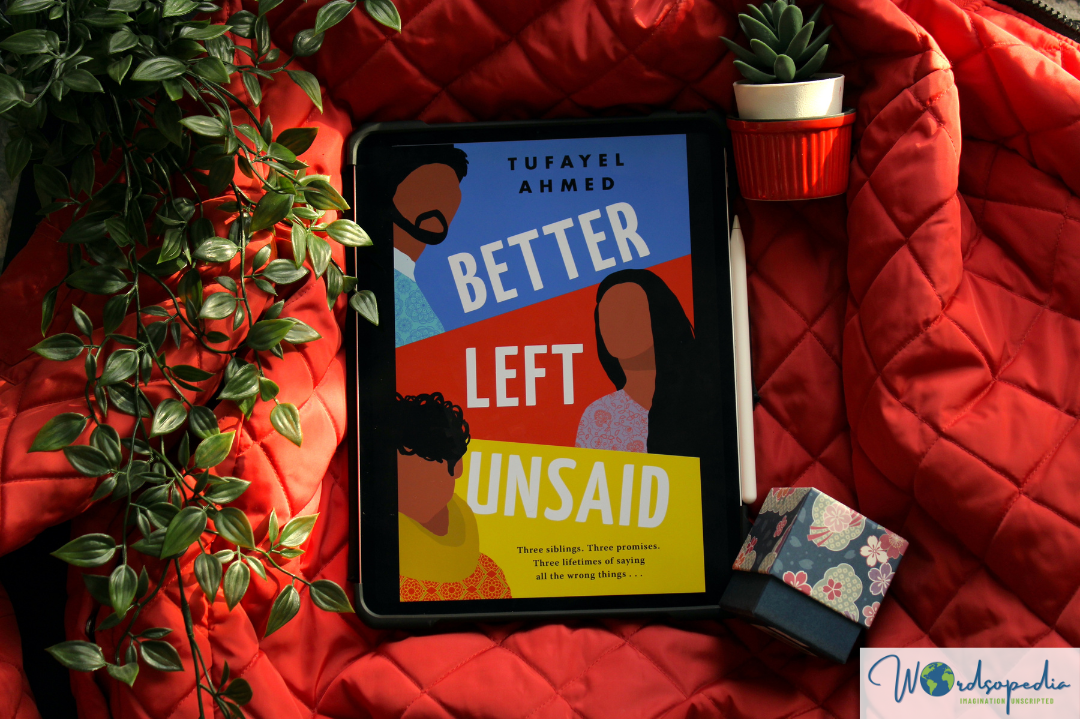Set in Bow, East London, Tufayel Ahmed’s Better Left Unsaid is the story of a Bangladeshi immigrant family. High on emotions, this family drama addresses faith, belief, racism, trauma, love, family dynamics, and sibling bond.
Sultana and Abdul immigrated to the UK decades ago. Their children, Imran, Sumaya, and Majid, are British citizens by birth. Though the novel is narrated through multiple viewpoints–of the mother, older son, and daughter, Sumaya is the main protagonist.
Fahima, Imran’s wife, a devout Muslim woman, is subjected to a racist attack. The traumatised woman slips into depression, and Imran feels helpless. Despite having been estranged for years, he gets in touch with his sister Sumaya, who lives in New York. She takes the first available flight to be by Fahima’s side, whom she loves and admires a lot. Even though being back in the parental home brings back terrible memories, she tries her best to help Imran and his wife. But her brother’s controlling behaviour and condescending attitude ignite old feuds.
As the siblings spend more time together, skeletons come tumbling out of the closet. Both Sumaya and Imran had made promises to their mother while she was on her deathbed, and these promises have stopped them from leading truly happy lives. Each sibling is dealing with their own issues in silos and it takes them a lot of courage to share their secrets with each other.
Ahmed narrates the story through multiple viewpoints and each of them gives us a close and inside look into their lives. Sultana’s struggles as an immigrant and the adjustments she made reflect the times and her family circumstances. Her children, on the other hand, as first-generation immigrants, face a different kind of struggle. Imran, being highly traditional, struggles the most with balancing his Bangladeshi and British identities. Sumaya and Majid, free-spirited youngsters are well-adjusted to their surroundings, but their sexual identities and attitude toward life prevent them from bonding with Imran.
The strong point of this novel is the detailed characterization. The characters are flawed and believable. Unlike the older generation, youngsters smoke, drink, visit pubs, even explore physical relations, and have varied sexual preferences. I liked the manner in which Ahmed portrays them–so sure of themselves, and yet vulnerable and seeking approval. It was refreshing to see them break societal norms and not succumb to pressure.
The complex family dynamics and the strained relationship between the siblings are well-depicted. Ahmed provides decent resolutions to the problems faced by the siblings.
I would have enjoyed the book more if not for Sumaya’s and Imran’s constant whining about being a caretaker and taking care of their dying parents. While caregiving is definitely a challenging task, the constant ‘martyr’ spirit was too much to take.
Though this is the first time I am reading Ahmed’s works, it’s not my first story of Bangladesh immigrants. I read Silmy Abdullah’s Home of the Floating Lily a long while ago, and it remains unforgettable to date.
The author’s portrayal of Bangladeshi culture and traditions is up-close and personal. He made the setting come alive in front of my eyes!
Better Left Unsaid is an interesting saga of family dynamics. Readers who like multicultural expressions and family dynamics will enjoy this a lot.
Thanks to NetGalley and Amazon Publishing UK for the arc of this book. My review is honest and voluntary.
Wordsopedia Rating 3.4/5
| Title: Better Left Unsaid | Author: Tufayel Ahmed |
| Publisher: Amazon Publishing UK | Publication date: September 14, 2023 |
| Genre: Fiction—General | Format: eBook |
| ASIN: B0B1ZQYK6M | No. of Pages: 256 |
Buy your copy here on Amazon
About the author
Tufayel Ahmed is a journalist, author and lecturer born and raised in East London. He is the author of Better Left Unsaid (2023) and This Way Out (2022). His works centre bold and diverse characters from South Asian, Muslim and LGBTQ backgrounds and encompass themes of love, family, cultural difference and privilege.
Get in touch with the author on his website.

